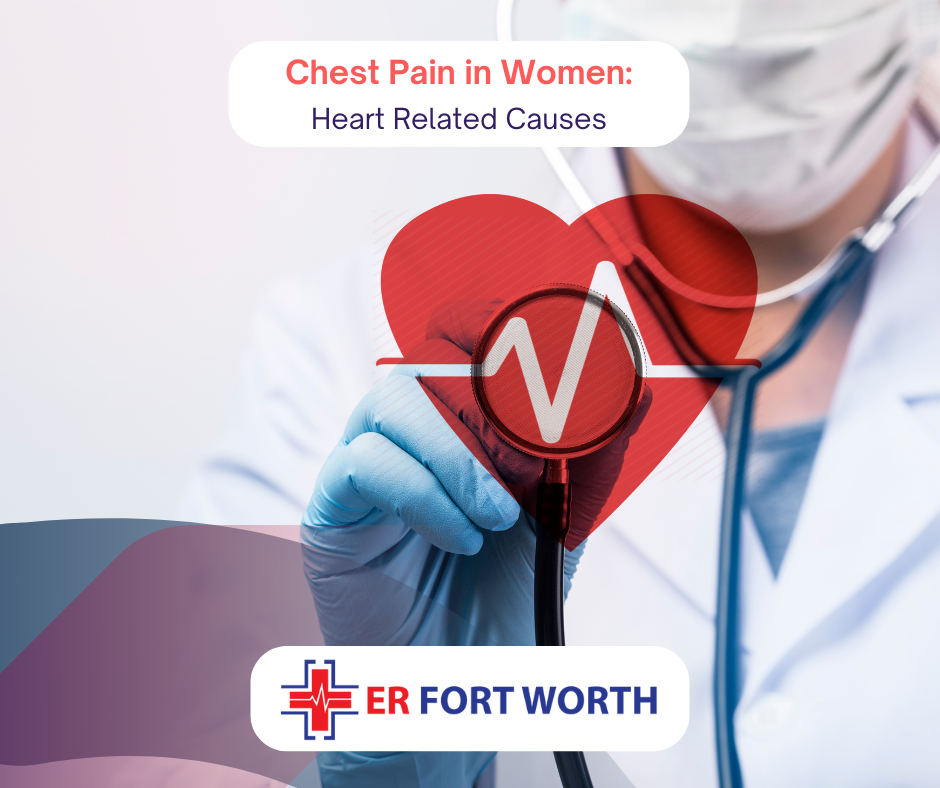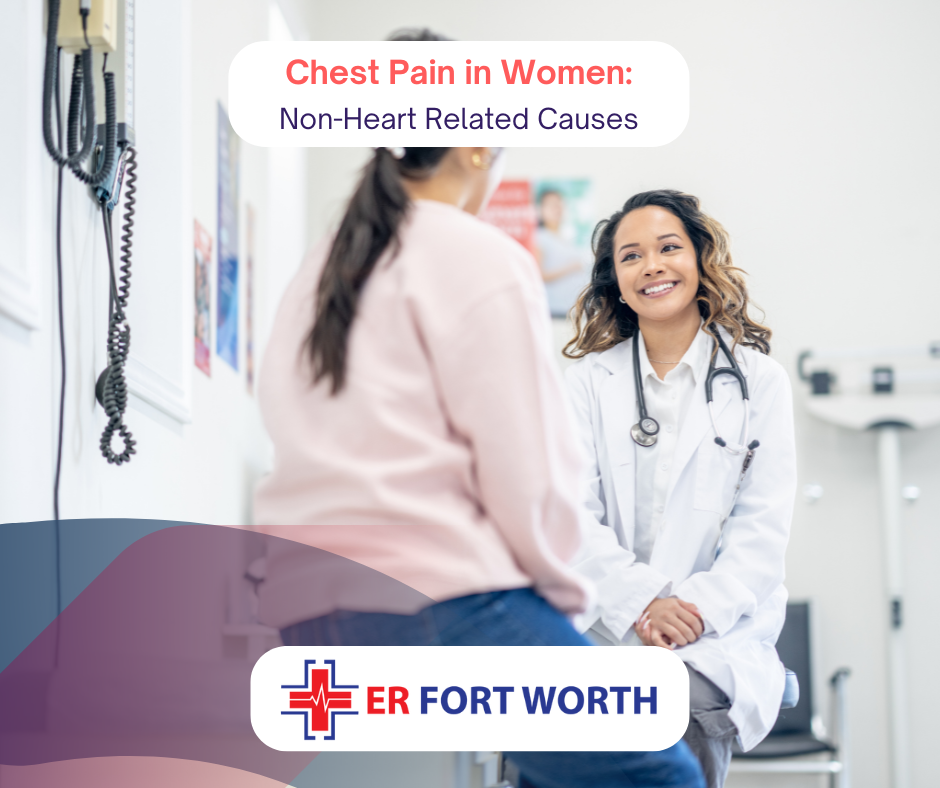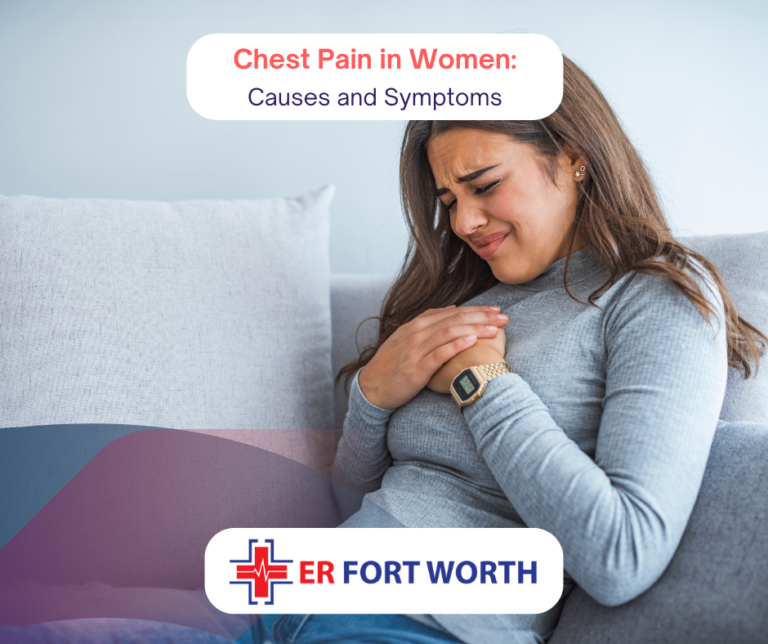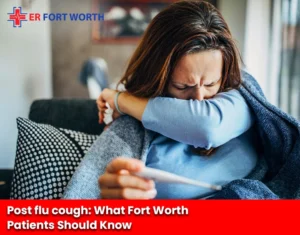Chest Pain in Women & Heart disease silently claims more lives in the United States than any other condition, with chest pain being a major warning sign. The symptoms of heart disease differ between men and women, making recognition and swift action crucial.
Understanding the nuances of chest pain in women — its types, severity, and causes — is vital for your heart’s health. Yet many remain unaware of the associated risk factors, potentially delaying life-saving care.
At ER of Fort Worth, we understand the unique symptoms and risk factors women face. Our team of experienced professionals is dedicated to providing immediate, specialized care for women’s chest pain, ensuring accurate diagnosis and effective treatment. Time is critical in any emergency, especially with chest pain.
Chest Pain in Women: Causes and Symptoms
Chest pain is one of the common reasons for emergency room visits in the United States. It varies greatly among individuals, ranging from sharp, stabbing sensations to dull aches. It can indicate a serious heart-related issue or stem from numerous less severe conditions. Getting emergency medical help is the only way to know the cause.
According to research, only 5.5 percent of ER visits for chest pain lead to a diagnosis of a serious heart-related problem. Let’s take a look at heart-related and non-heart-related chest pain in women and its causes.
1. Heart-Related Causes

Heart Attack
A heart attack occurs with a prolonged blockage in one or more coronary arteries, leading to a reduction or complete blockage of blood flow to the heart.
Symptoms
- Chest discomfort in the center, described as pressure or tightness.
- Pain can spread to the arms, back, neck, or jaw.
- Other symptoms include nausea, shortness of breath, anxiety, lightheadedness, and sweating.
Most people wait two hours or more for help, which can lead to lasting heart damage or death.
| Seek medical help immediately if you experience heart attack symptoms |
Angina
Angina is caused due to the narrowing of coronary arteries, resulting in temporarily reduced blood flow to the heart. It’s considered a warning sign of potential heart problems but does not usually cause permanent heart damage.
Symptoms
- Chest discomfort or pain that may feel like pressure or squeezing.
- Pain usually lasts for a short duration (around 5 to 15 minutes) and is relieved by rest or medications.
- It’s usually triggered by physical exertion or stress and relieved by rest.
Pericarditis
Pericarditis is the inflammation of the pericardium, the thin sac surrounding the heart. It can be caused by viral, bacterial, or fungal infections, autoimmune conditions like lupus or rheumatoid arthritis, heart surgery, heart attack, trauma, or certain medications.
Symptoms
- Stabbing chest pain that typically worsens when lying down or taking deep breaths.
- Acute (sudden and short-term)
- Chronic (lasting longer and recurring over time)
2. Non-Heart-Related Causes of Chest Pain

Gastroesophageal Reflux Disease (GERD)
Acid reflux causes a burning sensation in the chest, often mistaken for heart pain.
Musculoskeletal Problems
Conditions like costochondritis (inflammation of the chest wall) cause sharp, localized chest pain in women.
Pulmonary Issues
Lung conditions such as pneumonia, pleuritis, or pulmonary embolism can cause chest pain, often accompanied by difficulty breathing.
Bone or Muscle Problems
Chest pain can result from bone or muscle problems, such as broken or bruised ribs, causing pain and swelling.
Muscle Strain
Overexertion or injury to the chest muscles can cause pain that mimics heart-related chest pain. This can occur due to heavy lifting, repetitive movements, or sudden twisting motions.
Costochondritis
Inflammation of the cartilage that connects the ribs to the breastbone (sternum). It often causes sharp pain in the chest that worsens with movement or deep breathing.
Digestive Issues
Gallbladder Disease: Conditions such as gallstones or inflammation of the gallbladder can cause chest pain.
Peptic Ulcer: Ulcers in the stomach or duodenum (first part of the small intestine) can cause burning or gnawing pain in the upper abdomen that can radiate to the chest.
Women’s Chest Pain Symptoms
Women experiencing chest pain often report symptoms that differ from men. Chest pain in women can vary from mild discomfort to severe pain and may present as:
- Sharp or dull sensations
- Pressure or tightness, often described as squeezing
- Pain that radiates to the shoulders, arms, neck, jaw, or back
- Shortness of breath
- Nausea, vomiting
- Sweating
- Dizziness or lightheadedness
- Palpitations
What Causes Chest Pain in Women
- Age: Risk increases with age, especially after menopause.
- Family History: A history of heart disease in close relatives.
- Smoking: Active smoking or exposure to secondhand smoke.
- Autoimmune Conditions: Such as lupus or rheumatoid arthritis, which can affect heart health.
- History of Preeclampsia: A pregnancy complication associated with increased cardiovascular risk later in life.
- Mental Health: Depression and anxiety can impact heart health.
- High Blood Pressure
- High Cholesterol
- Diabetes
- Obesity
- Physical Inactivity
- Stress
Conclusion
Understanding the various causes and characteristics of chest pain in women can help you respond appropriately. By recognizing the signs and seeking timely medical attention, you can take proactive steps toward safeguarding your heart health. If you are experiencing persistent chest pain, we recommend visiting our emergency room in Fort Worth immediately. Remember, when it comes to severe chest pain, every moment counts.
| Visit ER of Fort Worth offering 24/7 emergency care you can rely on |
FAQs
When should women seek immediate medical help for chest pain?
Women should seek emergency medical care if they experience severe chest pain that lasts more than a few minutes, or pain accompanied by shortness of breath, nausea, sweating, dizziness, or pain that radiates to the arms, neck, jaw, or back.
Can anxiety cause chest pain in women?
Yes, anxiety can cause chest pain in women. Anxiety-induced chest pain can manifest as muscle tension, hyperventilation, panic attacks, or stress response, leading to increased heart rate and blood pressure.
Can chest pain go away without treatment in women?
Yes, chest pain in women can sometimes go away without treatment if the cause is minor, such as muscle strain, indigestion, or gas. However, it’s crucial not to ignore chest pain. If it’s related to a serious condition, delaying medical attention could result in significant health risks.
What are the key considerations for maintaining cardiovascular health in women?
Maintaining cardiovascular health in women involves several key practices:
- Regular medical check-ups
- Consuming a balanced, healthy diet
- Regular exercise and physical activity
- Managing a healthy weight
- Quitting smoking
- Stress management




